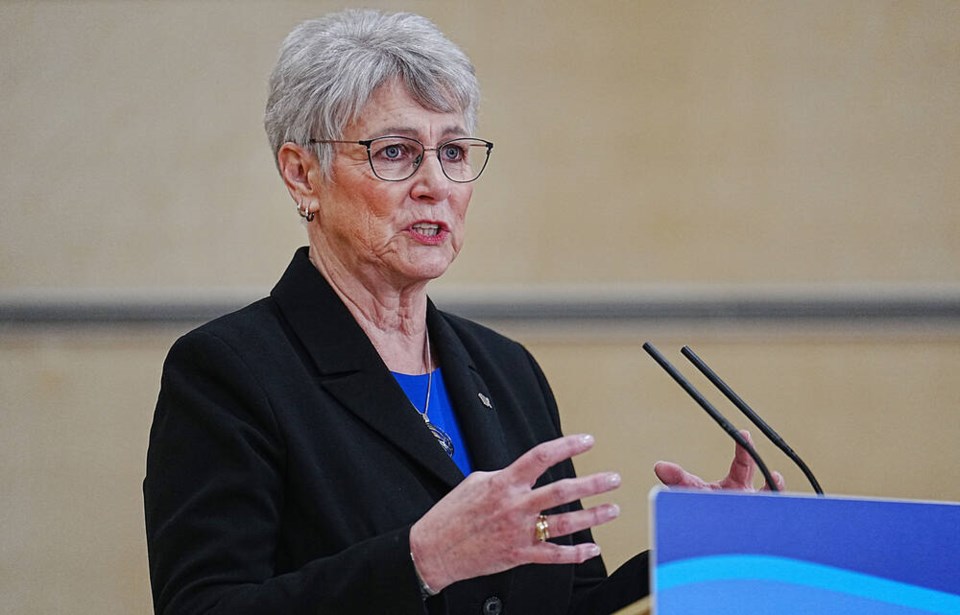Business organizations are applauding a break on payroll taxes in today's provincial budget, but continue to raise concerns over the B.C. government’s lack of fiscal discipline.
The budget that Finance Minister Katrine Conroy handed down today includes a break on the Employer Health Tax (EHT).
The government is lowering the threshold that triggers it from $500,000 annually in payroll to $1 million.
“Relief for small businesses was our number one ask and so we are pleased to see movement on the Employer Health Tax (EHT) threshold in the budget,” Greater Vancouver Board of Trade (GVBOT) CEO Bridgitte Anderson said in a press release.
But otherwise, GVBOT is giving Conroy a C grade for her budget.
“While there is some relief for today, there is concern for tomorrow,” Anderson said. “The fiscal track is getting a post-pandemic dose of reality with projected deficits totaling $22 billion over the next three years and a near 50 per cent increase in taxpayer supported debt-to-GDP ratio, the fiscal track of the government is certainly flashing yellow.”
The Business Council of BC (BCBC) and Independent Contractors and Business Association (ICBA) both criticized the budget for its lack of spending restraint.
“We do not agree the government should be running large operating deficits when the economy is near full capacity and people are struggling to pay the bills because of inflation,” said BCBC chief economist Ken Peacock.
“The B.C. Budget, released today by Finance Minister Katrine Conroy, projects $27.9 billion in cumulative operating deficits over four years, with no discernible path back to balance or surplus,” said the ICBA.
“These operating deficits will severely limit British Columbia’s ability to respond to future economic shocks and pursue economic development opportunities,” said ICBA chief economist Jock Finlayson.
“Absent a recession – which the provincial government denies is here, despite B.C.’s per-capita GDP basically stagnating for seven years – there is no justification for covering government operating costs through borrowing.”
A number of resource industries, from mining to oil and gas companies, are praising a First Nations loan guarantee program announced in the budget that is designed to help First Nations take equity stakes in resource projects, like mines, pipelines, and LNG plants.
“As a company that operates critical energy infrastructure in B.C. and across Canada, we have heard from many Indigenous groups interested in partnering on existing energy infrastructure and believe that they will view this as a positive move,” Enbridge (TSX:ENB) said in a press release.
“TC Energy applauds the province of British Columbia for launching the First Nations Equity Financing Framework,” said TC Energy (TSX:TRP).
“The provincial government has taken an important step towards economic reconciliation by establishing the new program through Budget 2024. Creating opportunities for Indigenous communities to own major projects in their communities make sure that they can share in the benefits of these projects, and build a more equitable, brighter future for the province.”
“I’m thrilled that the opportunity for First Nations to pursue ownership of major projects in B.C. is becoming real,” said Chief Sharleen Gale, board chairperson of the First Nations Major Projects Coalition.
“Access to affordable and substantive capital to participate in major projects that cross our lands is a key issue that brought First Nations together to form FNMPC. Today’s announcement marks a major step in advancing economic reconciliation in British Columbia.”
Clean Energy Canada praised the budget for striking a balance between climate change mitigation and adaptation and the economy.
“Budget 2024 strikes the right balance between preventing and preparing for climate change while simultaneously helping build a cleaner economy and improving our export competitiveness,” Clean Energy Canada executive director Mark Zacharias said in a news release.
“New investments in building the clean economy and addressing climate change total $1.3 billion over three years, including $405 million to prepare for and respond to climate emergencies, which the budget rightly identifies as one of the key risks to the province’s economic outlook.
“Additionally, Budget 2024 provides $318 million to support grant and rebate programs to move toward cleaner transportation, buildings, and communities, alongside $474 million to support critical transportation and community infrastructure. This includes $40 million for heat pump rebates and another $30 million for EV charging upgrades.”
The budget notes that this is the first year that a new output-based carbon pricing system with replace the carbon tax for heavy industry. The carbon tax remains for everyone else. For industry, benchmarks will be set, and industries will pay for emissions based on whether they exceed or fall below those thresholds.
“The new OBPS provides better carbon pricing policy for mining and smelting operations in B.C. that will continue to incentivize GHG emission reductions, while improving the competitive position of BC’s critical mineral sector,” said MABC president Michael Goehring.
The budget adds $24 million over three years to provide resources for regional and major mines permitting and to support the Mineral Tenure Act modernization process, said the Association for Mineral Exploration (AME).




